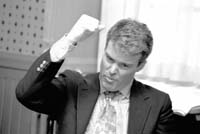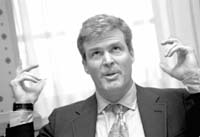Upsetting the scientific applecart:
Horgan says glory days are gone
When John Horgan appears these days, he expects conflict. "I've never been to speak where everyone agreed with meŅand if they did, I'd be alarmed." Horgan had no cause for concern last week when he faced a packed house to deliver a Beatty lecture outlining his controversial views on science.
Horgan, a senior writer for Scientific American, generated a storm of protest throughout the scientific world with the recent publication of his book The End of Science. In it, he argues that we are looking at the limits of scientific knowledge, that there isn't much in the way of jaw-dropping discovery likely to happen from now on, and that the role of scientists may be merely to fine-tune existing theories.
 |
| We're not going to invent warp drive space ships that take us to other galaxies or universes. We're not going to become infinitely wise or immortal through genetic engineering. |
"We've got the major paradigms in place which form a map of reality, of cosmic and biological creation. In the future I think scientists are going to be reduced to filling in details of this map, and there won't be any of the kind of earth-shattering revelations we got with Darwin's theory of evolution, with the discovery of quantum mechanics, Big Bang theory, DNA, that kind of thing." argues Horgan.
"The greatest barrier to future science, and especially to pure science, is its past success. Given how far science has already come and given the limits constraining further research, science will be hard-pressed to make any truly profound additions to the knowledge it's already generated."
Horgan says some scientists are quite content to fill in details and he doesn't deny that their work is important. He cites the example of how a mutation in a particular section of DNA might trigger breast cancer. "There are some big questions left to be answered--they just won't have the effect of altering our view of the universe."
He describes another class of scientists who, he says, are "too ambitious or creative" to settle for filling in details or developing practical applications. This group of "overreachers" seeks to answer questions that Horgan calls unanswerable, and he labels their work "ironic science." Horgan, with a degree in English, says he borrowed the term from literary criticism.
"In literature, an ironic statement has multiple meaning, and in the same way there are theories in science that shouldn't be considered literally true. They're provocative statements about reality in the same way a poem might be."
Horgan includes such fields as cosmology, psychology, psychoanalysis, social science, Marxism and sociobiology in the ironic science category. In his lecture, he described an area of theoretical physics which he considers to be a "spectacular" example.
"For more than a decade, superstring theory has been the leading contender for a unified theory of physics. Often called the 'theory of everything,' it posits that all matter and energy in the universe stem from infinitesimal, string-like particles wriggling in a hyperspace of 10 or more dimensions. A superstring is apparently as small in comparison to a proton as a proton is to the entire solar system. Probing this realm directly would require a particle accelerator 1,000 light years around. These kinds of ironic theories can be tremendously interesting, mind-blowing and all, but they don't converge on solutions in the way that real science does."
His own theories have been challenged by critics as being ironic and untestable. "That's true in a way," says Horgan, "but that's true about any sort of prediction about human history. Simply because something can't be unconditionally proved doesn't mean you can't use rational arguments in favour of one vision over another. I think my vision is more plausible than others."
 |
| I used to love to think about all these long-term futures like the ones described in the book where we all become computers and turn the universe into giant computers. But those are fantasies, that's not going to happen. |
Since the publication of his book, which is based on interviews with well-known scientists, Horgan's views have been hotly debated and widely criticized. In his lecture he reviewed the major arguments raised against him and presented a rebuttal for each.
He seems to relish the flap his book has caused, although the suggestion that it might be used in arguments to cut research funding makes him "squeamish," he says. "But it's fairly obvious that my views are unusual and I think that the enterprise of science can certainly absorb what I'm saying without taking some mortal blow." He does concede, however, that one criticism--that his position reflects a lack of imagination--"really gets under my skin.
"It's all too easy for us to imagine great discoveries just over the horizon. Our culture does it for us with TV shows like Star Trek and movies like Star Wars, and political rhetoric which promises that tomorrow will be different from and certainly better than today. What I want people to imagine is this: What if there is no big thing over the horizon? What if all we have is basically all that we're going to have? We're not going to invent warp drive space ships that take us to other galaxies or universes. We're not going to become infinitely wise or immortal through genetic engineering."
In an interview with students interested in science writing the day before his lecture, Horgan talked about wrestling with his own imagined vision of the future. "It took me a long time to come to this, to realize that progress wasn't going to continue. I used to love to think about all these long-term futures like the ones described in the book where we all become computers and turn the universe into giant computers. But those are fantasies, that's not going to happen."
He says his fellow science writers share some of the blame for whipping up overheated expectations. "I think there's too much cheerleading in science journalism nowadays, what's sometimes called 'gee-whiz' science, where you're really just talking about the wonders of nature. That's fine, but I think it carries over into too much science journalism."
He gave an example of a story that appeared on the front page of the New York Times about the discovery of a gene responsible for causing alcoholism.
"They made it sound like a breakthrough and it was just crap! Without doing much research, I found out that their claims had not been corroborated by follow-up studies. But I think science journalists saw this as a classic gee-whiz story--something as complex as alcoholism explained by genes. 'Wow, that's really interesting!' I'd like to see more really critical science journalism in the same way that there's critical political reporting."
Some critics have suggested that the beliefs he professes are less a reflection of principle and more an exploitation of opportunity. "Just this month, another Canadian reviewer suggested that I concocted this whole end-of-science schtick just as a way to package a lot of great material about famous scientists that I'd gathered over the years," says Horgan.
 |
| My view that science is ending is deeply disturbing to me because I can't imagine anything better for humanity to do than to try to figure out what we are, where we came from and where we're going. |
"Anyone who doubts whether I really believe science is ending can ask my wife or friends or colleagues at Scientific American my true intentions. They'll give you horror stories about having to endure years of interminable harangues about the limits of science from me."
He insists his strong views arise from his profound love of science which at the end of his lecture he called "the most miraculous and noble and meaningful of all human creations. My view that science is ending is deeply disturbing to me because I can't imagine anything better for humanity to do than to try to figure out what we are, where we came from and where we're going.
"I sincerely hope that some future scientist, maybe even someone in this room, will discover something as important as natural selection or quantum mechanics or the expansion of the universe--something that spans a whole era of pure science and proves me wrong. I also sincerely believe that isn't going to happen."
Doubtless the dialogue Horgan has triggered will persist for some time, whether or not science does the same. But throughout this entire debate, Horgan has apparently maintained his sense of humour. During a fairly fractious question period, a professor asked, "In view of your hypothesis, can you tell us when to expect the last issue of Scientific American?"
Horgan good-naturedly responded that his position was not formally endorsed by his magazine. He added, laughing, "We plan to dance on the grave of science for decades to come."
by Diana Grier Ayton
Research: Ellyn Kerr
For some local reaction to Horgan's views, see Letters and Opinion.

